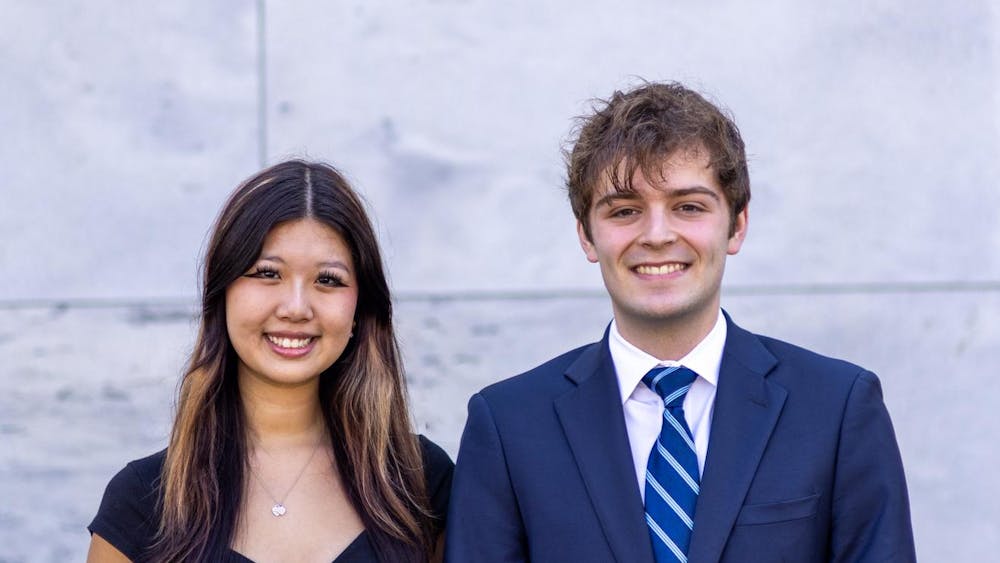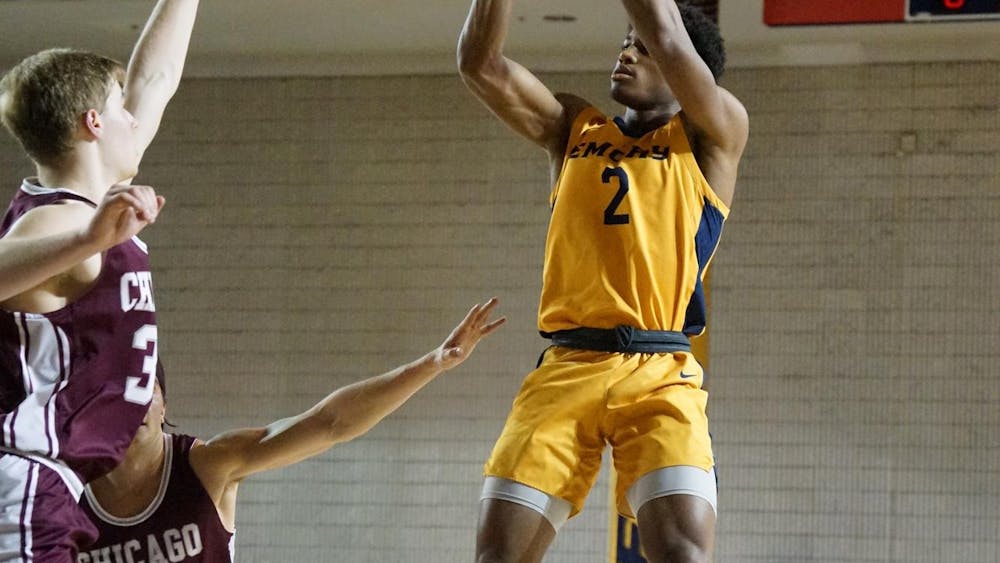
In a virtual town hall on Tuesday, Emory College and Campus Life administrators outlined campus expectations for the fall semester and addressed student questions about academics, housing, dining, safety protocols and other campus resources.
Vice President and Dean of Campus Life Enku Gelaye emphasized that the College is exploring ways to enforce health protocols without delegating administration to the Emory Police Department. Students are encouraged to keep each other accountable for following rules such as staying out of dorms they do not reside in.
“We will be empowering you as students to set and execute the standard for the community, because we know you have the most at stake for being on campus,” Gelaye said.
The event was run by Gelaye and College Dean Michael Elliott, with questions fielded by College Council (CC) President Aditya Jhaveri (21C) and CC Vice President of Communications Riya Mehta (22C). Though Jhaveri and Mehta formulated questions based on CC Instagram polling from June 19 to 22, virtual attendees also asked questions via the Zoom chat and received responses in real time.
While administrators have not finalized all details, Elliott noted that changes will be substantive, stating, “The campus will look different in the fall, [but] it will be a meaningful time to be a part of a University community and an academic community.”
Academics
The only change made to General Education Requirements was the waiver of one Physical Education (PE) requirement for all students. Students graduating in the upcoming fall, spring or summer semesters will have all PE requirements waived, regardless of how many they currently have. Students graduating after these semesters will only have to take one PE course. The number of PE courses offered in the fall will be reduced but still available for those who wish to complete this requirement.
A new course atlas will be fully updated on July 1 for College students to re-register for classes, and course offerings will not differ significantly from previous listings. However, students should expect many courses to be online and it is very unlikely they will have all in-person classes. Some classes, such as science courses with labs, may have a combination of online and in-person interaction.
Tuition will remain the same regardless of what combination of online and in-person classes students take. While many attendees expressed concerns that online classes will not offer the same quality of education as in-person learning, Elliott believes that the upcoming semester’s online courses will deliver a “high quality education.”
“The courses that will be online in the fall will be very different from in the spring,” Elliott said, explaining that over 650 faculty members are currently undergoing online teaching training to better design coursework for an online format.
Students can choose to take a leave of absence for the semester at any time prior to the first day of classes. Incoming students must contact admissions to defer their acceptance.
Housing and Dining
Residence Life and Housing Operations noted in a June 22 email that no more than two students may room together and some students will receive new housing assignments based on residence hall density. Associate Vice President of Campus Life David Clark clarified at the town hall that this will not affect many students and those with new housing assignments would likely be able to choose their roommate or receive a single.
Additionally, first and second-year students will no longer be required to live on campus for the academic year and can seek off-campus housing. New housing assignments for those relocated will be posted on July 15 and students will have until Aug. 1 to cancel their University housing agreements.
If students wish to stay home for the fall semester and return to campus in the spring, housing will most likely be available. These students, however, will have to reapply for housing.
Students will also likely not have to move out of their dorms completely at the end of the fall semester unless circumstances drastically change. Elliott noted that if a fall COVID-19 outbreak occurred before Thanksgiving break, the University would assess the severity of the threat to the Emory community and make a decision about students leaving campus.
“We no longer felt reasonably confident [in March] that we could keep the community safe in house on campus,” Elliott said. “If that happens again, we would be forced to make the same decision.”
While the details of how meal plans will work are incomplete, more dining options will be available in outside tents across campus that will provide hot and grab-to-go meals. The University is working with on-campus businesses like Kaldi’s Coffee and Highland Bakery, as well as the Farmer’s Market vendors, to set up tents as well.
Though first and second-year students must still have meal plans regardless of where they’re living, Clairmont campus residents will not be required to purchase a meal plan. Students will receive new meal plan options by July 15 and will be able to select one until Aug. 1.
Campus Resources and Activities
Facilities like the libraries, Emory Student Center and Woodruff P.E. Center are expected to be operational in various capacities. Certain areas will be closed off in order to reduce occupancy and prevent excessive congregation, with signage posted to indicate maximum capacity. Additionally, small classrooms may be used as group study spaces.
Changes to shuttle transportation involve shuttles being added to key routes with higher volumes of traffic and altered parking patterns. Faculty and staff that can work remotely are also being asked to do so to free up parking spaces for healthcare workers and on-campus staff and reduce congestion on shuttles.
Mental health resources through Counseling and Psychological Services (CAPS) will be available virtually, similar to the past spring semester. The University is also working on plans to expand counseling resources, particularly for those who will be outside Georgia or the United States in the upcoming semester.
Administrators emphasized that addressing mental health challenges for students, faculty and staff alike will remain a top priority.
“This is something that we’re really actively working on and trying to figure out from a community perspective how we respond to and support the mental health challenges we’re all struggling with,” said Director of CAPS Wanda Collins.
Programming from Emory offices such the Office for Racial and Cultural Engagement will take place virtually. Student organizations will also be encouraged to hold meetings and events virtually as much as possible.
While the NCAA announced on June 11 that Division III schools can begin practices as early as Aug. 10, decisions on how athletics will operate are still pending and will be communicated in mid-July. A Campus Life team is also communicating with national Greek Life officials on what protocols will be in place, with virtual rush being a possibility.
Currently, undergraduate students are not permitted to work in research labs due to reduced density. The University is working on a process to re-integrate undergraduates into labs when it is safe to do so.
Gelaye stressed that student input via surveys and direct communication will be considered as decisions on group restrictions and student activities are made.
“These are not decisions we would make unilaterally,” Gelaye said. “Know that we are thinking intently and intentionally about students and seeking feedback and trying to incorporate as much as we can into our planning.”
Safety Protocols
All students will be given a “Welcome Toolkit” upon arriving on campus that includes two masks, hand sanitizer, wipes, a door opening tool and a pack to hold these tools. Everyone is required to wear a mask at all times in common spaces.
The University has prepared for the possibility that students will get sick during the semester and have protocols in place should that happen. Students would likely be isolated in buildings separate from their peers, and academic accommodations with the Office of Undergraduate Education would be made based on the individual’s personal circumstances. Additionally, faculty members are reconfiguring attendance policies to take into account this possibility.
A document with all expectations, currently coined the “Emory Community Compact,” will be provided to students once more details are finalized. Clark also noted that “the intention is to offer COVID-19 testing on campus to students free of charge.”
Attendee Jack Miklaucic (23C) expressed cautious optimism about the safety protocols discussed at the town hall, noting that more information needs to be released for students to make informed decisions about returning to campus.
“I was really impressed by the level of thought they’ve put into planning and responding to students’ concerns,” Miklaucic said. “I hope they cover more of their plans for contact tracing and locations for quarantined students on campus soon, but I understand that takes time.”








